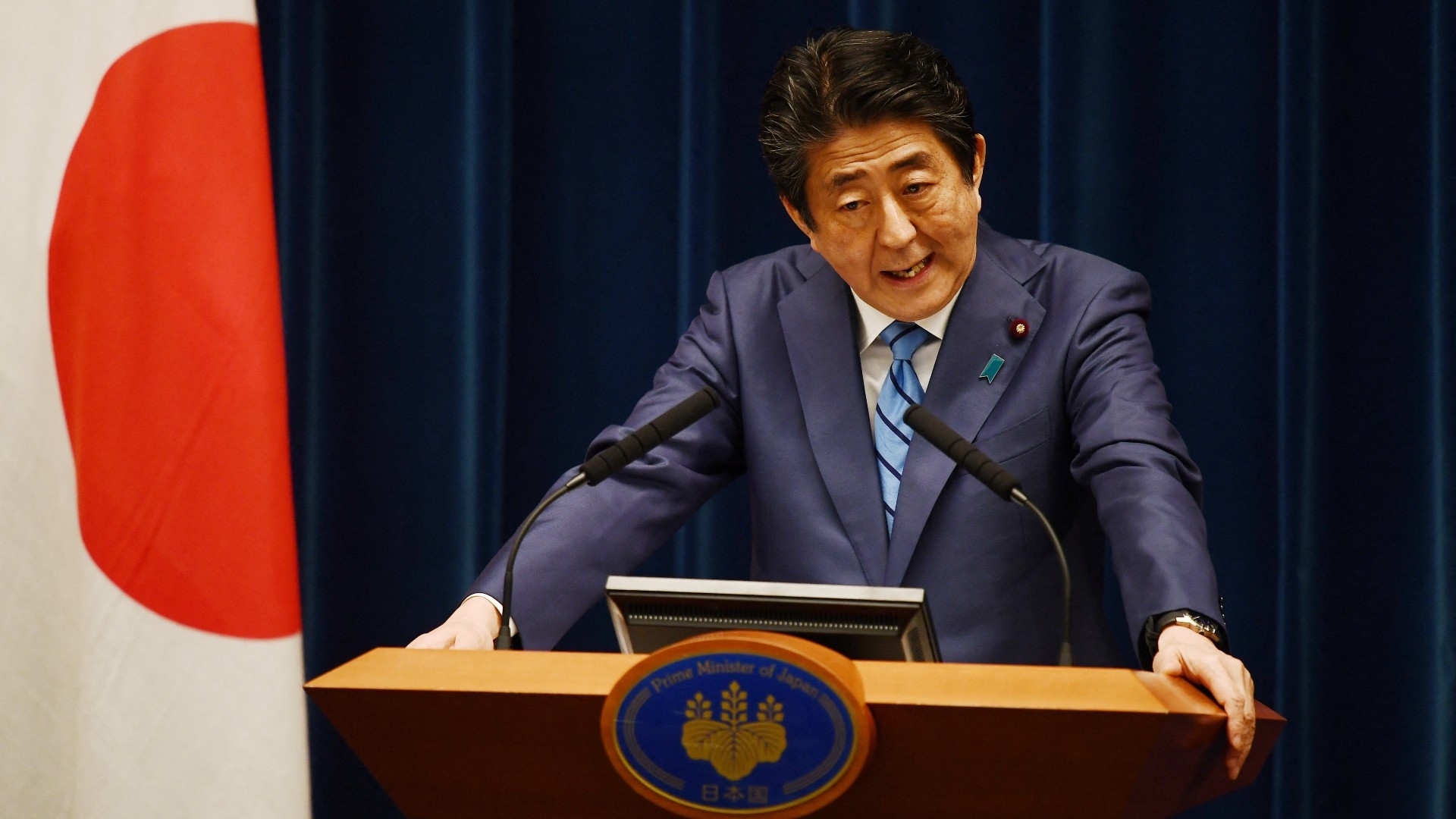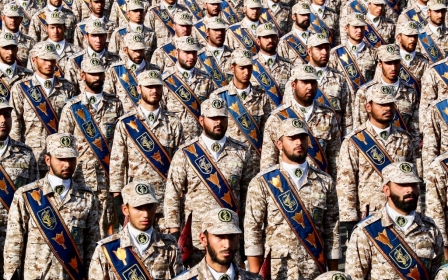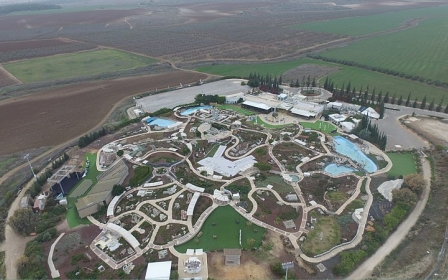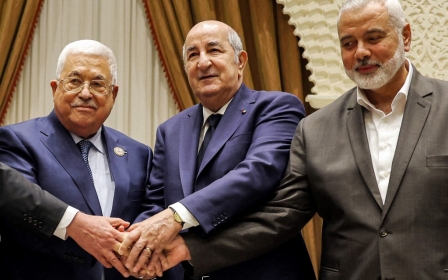Shinzo Abe: Five key Middle East moments for Japanese leader

Shinzo Abe, Japan's longest-serving prime minister, was assassinated on Friday morning while giving a speech at a political event.
He was shot twice on a street in the southern city of Nara, and died in hospital shortly after.
A 41-year-old has confessed to shooting Abe with a homemade gun. The suspect is a member of Japan's maritime self-defence force - the country's equivalent of a navy.
Since the shocking act of brutality, in an officially pacifist nation where violent crime is relatively rare, messages of condemnation and condolences have poured in from around the world.
Abe first became Japan's youngest premier in 2006, but was forced to resign just a year later for health reasons.
New MEE newsletter: Jerusalem Dispatch
Sign up to get the latest insights and analysis on Israel-Palestine, alongside Turkey Unpacked and other MEE newsletters
He returned to power in 2012, and was subsequently re-elected twice, staying in power until 2020, when his health forced him to resign once again.
Abe had been described as a right-wing nationalist by some, particularly after a visit to a controversial shrine that honours Japanese Second World War leaders convicted as war criminals.
During his tenure, Abe became a major player on the international scene, enacting a domestically controversial hawkish foreign and defence policy, and navigating diplomacy in the turbulent years of former US President Donald Trump.
His time in office included several run-ins and encounters with countries in the Middle East and North Africa, including awkward state visits, terrorist atrocities and a cover-up which nearly led to his political downfall.
Abe's impact on the region was typified a month after his resignation in 2020, when the Egyptian government announced that a major new road would be named after him.
Middle East Eye takes a look at five key moments for Abe in the region:
Algeria terrorist attack
On 16 January 2013, just weeks into Abe's second stint in office, ten Japanese nationals were killed by militants in the eastern Algerian town of In Amenas.
Mokhtar Belmokhtar, an Algerian former al-Qaeda commander, took responsibility for the attack in which 39 foreign hostages and an Algerian security guard were killed. Twenty-nine militants were also killed as the Algerian army regained control of the plant three days later.
Japan suffered the highest number of fatalities, and the incident marked a key turning point in Abe's defence outlook.
During the hostage crisis, Japan was unable to attempt a rescue operation or escort survivors or bodies out of Algeria due to stringent laws dating back to the country's 1947 US-drafted pacifist constitution which banned the maintenance of a conventional military for war.
The restrictions frustrated Abe, who then charted out a legislative and budgetary path towards a more robust defence agenda.
Islamic State killings
Two years after the Algeria incident, the Japanese premier was reacting to another fatal hostage crisis.
In January 2015, Islamic State group militants released footage showing the beheading of Japanese hostage Haruna Yukawa.
A week later, Japanese journalist Kenji Goto, who had travelled to Syria in the hope of rescuing Yukawa, was also beheaded by the militants.
"I am extremely angry about these heinous and despicable terrorist acts. We will never forgive terrorists," Abe said at the time.
The former leader's public approval ratings improved following his handling of the hostage crisis, with the majority of Japan's public supporting his vow to step up aid to regions impacted by the Islamic State group.
In 2018, Japanese freelance journalist Jumpei Yasuda announced he was safe and well in Turkey, three years after having gone missing in Syria. Yasuda had gone to the country in 2015 to report on the death of his friend Goto, but was later held hostage by an al-Qaeda linked group for more than 40 months.
Abe thanked Turkish President Recep Tayyip Erdogan for Yasuda's "rescue" and arrival in Turkey.
Ill-fated Iran trip
A trip to Iran in June 2019 may have been Abe's most embarrassing international assignment.
Abe's visit to Tehran was the first by any Japanese leader in four decades, and he was keen to promote the idea of rapprochement, following rising tensions between the Trump administration and Iran.
"Middle Eastern peace and stability is essential not only for this region, but for the prosperity of the world," Abe said while standing next to then-Iranian President Hassan Rouhani. "Nobody wants war. Japan wants to do all it can to relieve tensions."
But the trip occurred at the same time that two petrochemical tankers - one of which was Japanese - were attacked in the Gulf of Oman. Washington, as well as several other international players, blamed the attack on Iran.
Back in Iran, with Abe sat across from him, Supreme Leader Ali Khameini suggested the Japanese leader had come to the country as a messenger of Trump, and was wasting his time.
Trump, who had encouraged the trip, later threw his Japanese counterpart under the bus by insinuating that his attempts at negotiation were well-meaning but naive.
Foot-in-mouth moment in Israel
In one of the more awkward interactions between Abe and the Middle East, a minor diplomatic stir was caused by a dessert choice during a state visit to Israel.
In May 2018, following high-level bilateral talks, the Japanese leader was served chocolate pralines inside a shiny leather shoe by a celebrity chef during a dinner with then-Prime Minister Benjamin Netanyahu.
Outdoor footwear is not allowed inside in Japanese etiquette, and shoes are generally seen as a lowly symbol in Japanese culture.
A Tokyo diplomat said at the time: "There's no culture in the world in which you put shoes on the table. What was the distinguished chef thinking?
"If it was humour, we don't think it is funny; we were offended on behalf of our prime minister."
Israel's foreign ministry responded by saying that it was not involved in approving the dishes and that it had the utmost respect for Abe.
South Sudan cover-up
Towards the latter part of Abe's time in office, details about a peacekeeping mission in South Sudan ended up becoming one of the most controversial moments in his premiership.
Following decades of pacifism, in 1992 Japan signed a peacekeeping law that would allow it to participate in UN missions. The law stipulated that Japanese peacekeepers could only be deployed following a ceasefire, and could only use their weapons in self-defence.
On that basis, Japan sent 350 troops to serve in South Sudan in 2011, the year when the country gained independence from Sudan.
Fighting has broken out in South Sudan on several occasions since it was founded, including an escalation in July 2016 in the capital Juba.
At that time, Japanese troops sent home reports of active combat, which may have violated the peacekeeping laws.
Japan's defence ministry initially tried to claim the reports had been lost, but the information re-emerged in early 2017 following a request under the Information Disclosure Law.
The scandal led to the resignation of the then-defence minister, and it threatened to bring down Abe's government.
News of the cover-up caused outrage in the pacifist nation, with many having already felt uncomfortable with Japan's role in South Sudan.
Abe later announced Japan's withdrawal from the African nation, in what some described as political calculation following the scandal.
Middle East Eye delivers independent and unrivalled coverage and analysis of the Middle East, North Africa and beyond. To learn more about republishing this content and the associated fees, please fill out this form. More about MEE can be found here.




